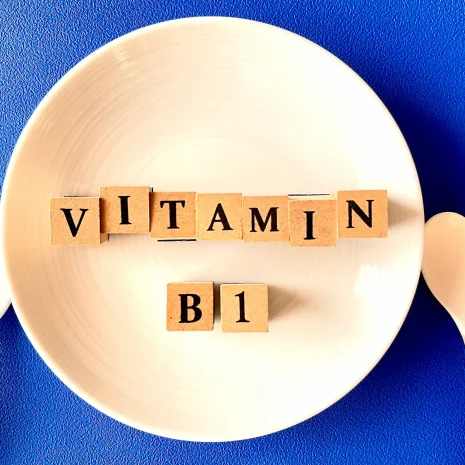What is vitamin B6?
Vitamin B6, also known as pyridoxine, is a water-soluble vitamin that plays a crucial role in several metabolic functions within the body. Essential for energy production, immune system health and the proper functioning of the nervous system, vitamin B6 supports the metabolism of proteins, fats and carbohydrates, enabling the body to utilise these macronutrients efficiently. Given its importance, ensuring adequate intake of vitamin B6 is vital for overall health.
What does vitamin B6 do for the body?
Vitamin B6 serves several key functions, which include:
- Energy Metabolism: It assists in breaking down amino acids and converting glycogen into glucose, helping the body generate energy from food effectively.
- Nervous System Health: Vitamin B6 is vital for synthesising neurotransmitters, the chemicals that facilitate communication between nerve cells. This role is crucial for maintaining brain health and cognitive function. In fact, research suggests there may be a correlation between higher intake of vitamin B6 and decreased risk of Parkinson’s disease.
- Immune System Support: B6 enhances immune function by promoting the production and activation of white blood cells that combat infections, thus playing an essential role in the body’s defense mechanisms.
- Haemoglobin Production: Vitamin B6 is involved in the production of haemoglobin, the protein that carries oxygen in red blood cells, supporting overall energy levels and bodily health.
What are the symptoms of vitamin B6 deficiency?
A deficiency in vitamin B6 can lead to a range of symptoms that negatively impact health. Common symptoms include:
- Fatigue and Weakness: Low levels of vitamin B6 can result in chronic tiredness and decreased energy.
- Cognitive Difficulties: Since B6 is essential for cognitive functions, its deficiency may result in trouble concentrating and diminished mental clarity.
- Headaches and Migraines: Individuals with insufficient B6 may experience frequent headaches and migraines.
- Heart Palpitations: Deficiency can lead to irregular heartbeats, causing discomfort and raising concerns about cardiovascular health.
- Mood Disorders: B6’s critical role in neurotransmitter production means that its deficiency can contribute to mood swings, depression and anxiety.
Recognising these symptoms is important, and consulting a healthcare professional for diagnosis and advice is crucial if you experience them.
What causes a vitamin B6 deficiency?
Several factors can lead to a deficiency in vitamin B6:
- Inadequate Dietary Intake: Not consuming enough vitamin B6-rich foods can cause deficiencies.
- Medical Conditions: Certain health issues, such as chronic kidney disease, malabsorption syndromes (like Crohn’s disease) and chronic illnesses, can affect the absorption of vitamin B6.
- Medications: Some medications, particularly those used for tuberculosis or rheumatoid arthritis, can disrupt vitamin B6 metabolism, thereby increasing the risk of deficiency.
Which foods are rich in vitamin B6?
Vitamin B6 is found in a variety of foods, making it relatively easy to include in your diet. Significant sources include:
Animal Sources:
- Poultry: Chicken and turkey are excellent sources of vitamin B6.
- Fish: Oily fish such as salmon and tuna are rich in this nutrient.
- Eggs: A versatile food that provides a good amount of vitamin B6.
Plant Sources:
- Bananas: A convenient snack that provides a quick vitamin B6 boost.
- Potatoes: Not only are they high in vitamin B6, but they also contain potassium.
- Legumes: Chickpeas and lentils are excellent plant-based sources.
- Sunflower Seeds: A great snack option that is rich in vitamin B6.
- Avocados: This nutrient-dense fruit also contains vitamin B6.
- Spinach: An excellent leafy green option that contributes to vitamin B6 intake.
Fortified cereals can also be a good source of a variety of essential vitamins, including B6. Other fortified foods, such as fortified milk, may also contain B6.
How much vitamin B6 do you need a day?
The daily requirement for vitamin B6 varies by age and gender. Generally, the recommended daily intake is around 1.3 mg for adult women and men. Pregnant and breastfeeding women may require higher levels to support foetal growth and postpartum recovery.
Since vitamin B6 is not stored in the body, consistent dietary intake is necessary. In cases where dietary sources are insufficient, vitamin B6 supplements should only be considered under a healthcare professional’s guidance.
Ensuring Adequate Vitamin B6 Intake
In summary, vitamin B6 is a vital nutrient that plays essential roles in energy metabolism, immune function and cognitive health. Maintaining adequate levels is crucial for overall well-being, and it is relatively easy to incorporate vitamin B6-rich foods into your diet.
While multivitamins can offer valuable support for overall health, it is essential to recognize that a balanced diet should remain the cornerstone of nutritional well-being. Multivitamins are intended to be a complementary measure and should not be considered a substitute for a diverse and nutritious food intake.
Note: It is strongly advised that individuals consult a healthcare professional prior to initiating any supplement, particularly if they have existing health conditions, are taking prescribed medications, or are pregnant.








